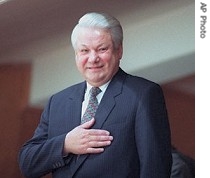2007年VOA标准英语-Former Russian President Boris Yeltsin Dies(在线收听)
Moscow
23 April 2007
Former Russian President Boris Yeltsin, who had been in declining health for several years, has died at the age of 76. Mr. Yeltsin served as Russia's president from 1990 until his surprise resignation on December 31 1999. During those years he helped steer his nation through some of the most tumultuous times in its recent history. VOA's Larry James takes a look at Boris Yeltsin and his legacy in this report from Moscow.
 |
| Boris Yeltsin (file photo) |
The booming voice of their newly elected president seemed to galvanize Russians. His defiance that day dealt a crushing blow to an attempted coup by communist hard-liners against Soviet leader Mikhail Gorbachev. It also marked the beginning of the end of the Soviet Union.
Just four months later, Mr. Gorbachev had resigned, the Soviet Union was no more and Boris Yeltsin had emerged as leader of a newly independent Russia.
Boris Yeltsin's rise to power had humble beginnings.
He was born the son of peasants in a two-room hut in a bleak Ural Mountain village near the city of Sverdlovsk, now known as Yekaterinburg. He never completely lost the common touch and in fact cultivated an image as a champion of the people.
As he rose through the ranks of the Communist Party, he renounced the usual privileges of power, riding crowded city busses and subways instead of chauffeur driven limousines.
But the very things that made Mr. Yeltsin popular often put him at odds with the Soviet leadership. In October 1987, at a full meeting of the Communist Party Central Committee, he attacked his mentor, Mikhail Gorbachev and his "perestroika" reforms as too much talk and too little action. The criticism did not go down well. He was publicly censured and stripped of his party post yet somehow managed to bounce back.
In June 1991, Mr. Yeltsin rode a pro-democracy wave to victory in Russia's first-ever popular presidential election. Two months later his heroic stand on the turret of a tank solidified his image as a crusader for change. But as the years unfolded, the country's feelings for the man called "the father of Russian democracy" fluctuated wildly between adoration - and hatred. Despite his commitment to democracy, he retained the authoritarian instincts of an old-style communist bureaucrat used to getting his way by force.
In 1993, President Yeltsin scrapped the Soviet-era constitution and dissolved parliament. Hard-line lawmakers and their supporters fought back. He responded by dispatching tanks to the parliament building to crush their revolt.
A year later, Mr. Yeltsin again issued a command that would result in bloodshed.
He ordered troops to the breakaway Chechnya region in an attempt to crush a separatist movement. More than 75,000 people - most of them civilians - died. As the war came to a disastrous close and Russian troops withdrew, he called it the greatest disappointment of his presidency.
The combination of a failed war and a failing economy seemed to spell the end for Boris Yeltsin's political career. But as he did so many times, he rose to the challenge in the 1996 presidential election, defeating his communist challenger by a healthy margin.
Just days before the election, he suffered a heart attack and would later undergo multiple bypass heart surgery that was to sideline him for more than six months. He came back strong for a brief time, but the demands of office, and his love of alcohol, soon took their toll. There were several incidents of erratic behavior that observers attributed to his declining health.
As his health slipped, his once sharp political instincts also seemed to fail him. He embarked on a series of government reshuffles, changing prime ministers seemingly at whim. As his term as president was winding down he was little more than a figurehead, but he had one final surprise for Russia.
On New Year's Eve 1999, with just six months remaining in his second term of office, he resigned - turning over the presidency to his prime minister, Vladimir Putin, the man he had handpicked to succeed him.
For a time it seemed Boris Yeltsin's legacy as the father of Russia's democracy had been tarnished by his political and physical decline. But once out of office opinion gradually softened.
His reputation may still be a little damaged by the blunders of his last few years, but what endures is the image of a burly Siberian clambering up on a tank to defy the Communists, and help Russia throw off its Soviet past.